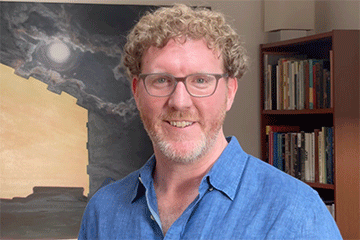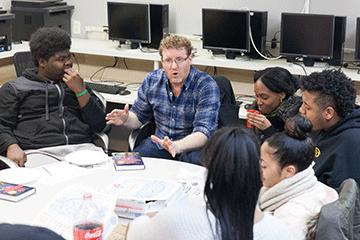
02/22/2022
Brendan Kiely, an award-winning New York Times bestselling author, will offer a frank conversation about how he, as a white man, experiences privilege, and what can be done to change our culture during a virtual Dinnertime Dialogue on Monday, March 7.
Presented by SUNY Cortland’s Antiracism Taskforce and the university’s Literacy Department, the evening with Brendan Kiely will take place from 7 to 8 p.m. Registration is required.
This inaugural Dinnertime Dialogue builds on the rich history of Sandwich Seminars supported by the SUNY Cortland President’s Office. The dinner dialogues, which give participants space to engage in conversations about issues related to antiracism and anti-oppression, are free and open to the entire campus community.
Kiely’s 2021 book,The Other Talk: Reckoning with Our White Privilege, offers this much-needed conversation for white kids who have probably not had to think much about racism. He also is the New York Times bestselling co-author of All American Boys (2016, with Jason Reynolds). He also wrote Tradition … Is Not an Excuse (2018) and other books. His work has been published in more than a dozen languages, and has received the Coretta Scott King Author Honor Award, the Walter Dean Meyers Award, and American Language Association’s “Top Ten Best Fiction for Young Adults.”
A former high school teacher and administrator in New York City, who also taught at the City University of New York (CUNY), Kiely now teaches on the faculty of the Solstice MFA Program in Creative Writing that is part of Lasell University in Massachusetts. He has a Master of Fine Arts from CUNY in creative writing.

“I grew up in an overwhelmingly white, working class kind of neighborhood and town,” said Kiely, who was raised just outside Boston in a town called Melrose, Mass. “And that influences a lot of why I’m reflecting back on what it means to have white privilege in my most recent book.”
According to Kiely, most children of color grow up experiencing “The Talk” with their families, the honest discussion about survival in a racist world. But most white kids are barely spoken to about race at all, and that needs to change, he said.
“Because not talking about racism doesn’t make it go away,” Kiely said. “Not talking about white privilege doesn’t mean it doesn’t exist.
“Even though I was living in an area where it didn’t seem like racism ‘quote-unquote’ affected many of us around me, in hindsight it’s thinking about just how not diverse my growing up experience was that I think helps influence why I’m thinking about racism and racial identity so much today.”
He clearly recalls, when he was in high school, the front cover of The Boston Globe the day after the rock band Green Day threw a free concert in Boston that turned into a riot, injuring more than 50 people. Although from subsequent publicity the 1994 melee did not appear to be race-related, the newspaper photo told a different story.
“The picture was of a white man — looked Irish background to me — tattoos on his bicep, with fist cocked back about ready to punch a Black man. It resonated for me as ‘This kind of racial tension is happening in the city that I identify with in the same way that it was happening in the 1970s during the bus boycott riots.’ That was a pretty startling moment for me to realize about how little had changed since then despite my thinking that it had beforehand in my life.”
It also dawned on Kiely that he had never socialized with the Black children who were bused into his mostly white town when he was going to elementary school.
“I wanted to be harder on myself on why didn’t I do a better job on being more inviting.”
He’s amazed that people whose own ancestors found a new life in America but faced adversity — like discrimination against Irish immigrants or Catholics — don’t always welcome newcomers.
“It’s interesting how quickly we abandon our allegiance to people when we used the same story to glamorize our own family’s history,” Kiely said. “How could folks whose Irish ancestors struggled so mightily not have heart for folks who are fleeing war and famine in Guatemala or wherever?”
People of color even over many generations have difficulty overcoming their “outsider” treatment by whites, who prefer to explain the difference with the narrative of “pulling themselves up by their bootstraps.”
“Yet two generations later, I don’t have the same struggles that are attached to my identity, as folks who are indigenous, folks who are in many Black families, folks who are in many families who are multigeneration in this country but are people of color. That’s why I think it’s essential for white folks like my own to acknowledge what privilege looks like as our family story changes generation to generation, in a way that doesn’t change as dramatically for people who are not white like my family.
“It says nothing about individual character and everything about systemic problems that could be addressed and should be addressed,” he said.
Kiely estimates he’s spoken with about 50,000 schoolchildren around the country in recent years as an author and public speaker. He’s hearing more stories from them of being culturally accepted and seeing more of that on TV shows and in the pages of novels.
“We are a multiracial country and those kinds of stories give me hope that we can be better about normalizing that kind of experience,” Kiely said. “Because that’s the case for so many people.”
For more information, contact organizer Keith Newvine, assistant professor of literacy and president-elect of the New York State Reading Association.